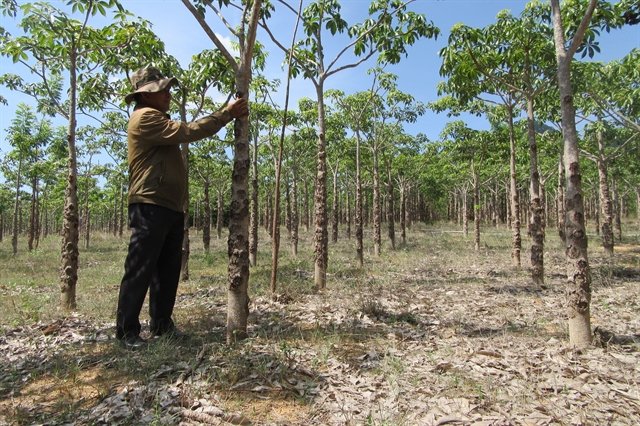 Society
Society


|
| Java olive trees grown in Ninh Thuận Province’s Thuận Nam District. — VNA/VNS Photo Nguyễn Thành |
NINH THUẬN — The cultivation of Java olive trees in vacant lands, bare hills and mountains in the sout-central province of Ninh Thuận is fetching farmers high incomes from harvesting their sap and has increased the forest cover.
The tree sap is used as a beverage since it is high in nutritional value, and is also used in the cosmetics and food processing industries.
Nguyễn Thành is among the farmers who have planted Java olive trees in mountainous fields in Ninh Phước District’s Phước Dân Commune, and earns a good income from their sap.
In 2010, with the support of the Thuận Nam District Protective Forest management, he planted 6,000 trees on his 2.5ha field, and began to tap the sap five years later.
He harvests two to three times a year, and earning VNĐ60 million (US$2,600) each time, he said.
Java olive trees grow easier than many others, require less tending and offer high incomes, he said.
Farmers can also use the leaves of the tree to feed cows, goats, sheep, and other livestock.
The tree has a large trunk, and its wood can be used to produce pulp, plywood and other products.
Trần Ngọc Hiếu, head of the Thuận Nam District Protective Forest management, said the tree is an indigenous forest species that copes well with drought. The province has the least rainfall in the country
It is intercropped with other plants, grown in mountainous forests and around houses in coastal areas to prevent desertification, he said.
Added to the province’s list of drought-resistant trees, it is grown on more than 1,000ha, mostly in Ninh Phước, Thuận Nam, Ninh Hải and Ninh Sơn districts.
Its sap is now sold at a price of VNĐ90,000-120,000 ($3.9-5.2) a kilogramme when dried. Four kilogrammes of fresh sap make for more than a kilogramme of dried sap.
The province is increasingly growing vegetation resistant to drought and with high value such as acacia, thanh thất (Ailanthus triphysa) and Java olive to increase its forest cover.
To expand the cultivation of Java olive under its combined agriculture-forestry model, the province supports farmers with soft loans and seedlings. It has taught them techniques for farming, harvesting the sap and semi-processing of the sap.
It has also supported linkages between farmers and companies for growing the trees and processing the sap, and helped promote products made from the sap in domestic and foreign markets. — VNS